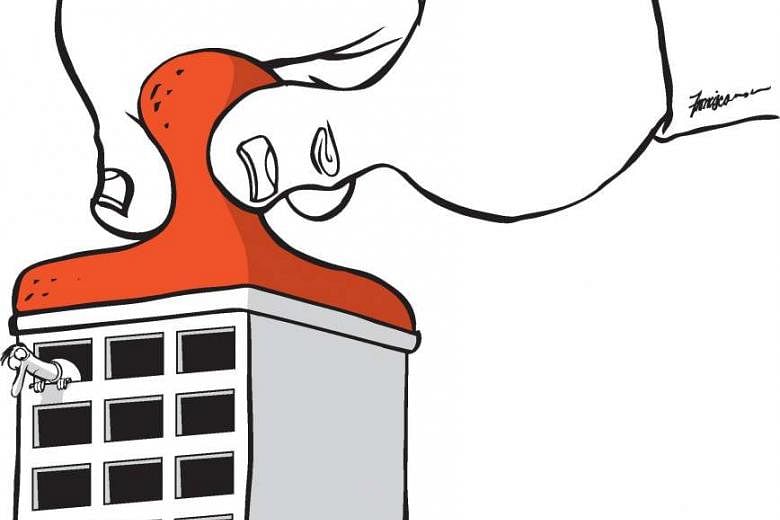Investors, developers and others in the property industry seem to have conditioned themselves to believe that the Additional Buyers' Stamp Duty (ABSD) is a temporary measure as part of a broader effort to cool the property market.
Introduced in 2011, it imposes an additional stamp duty of 7 per cent to 10 per cent for Singaporeans buying their second or subsequent properties. Foreigners pay more.
With home prices falling, vacancy rates rising and unsold inventory looming, many believe that the ABSD could be lifted soon.
But what if it never gets lifted?
Far-fetched? Maybe not, given certain comments made by Deputy Prime Minister Tharman Shanmugaratnam at a recent tax symposium in China.
His comments on having a tax system that promotes inclusive growth are all the more significant, given the times. While Singapore faces slower growth, which can handicap tax collection, funding requirements are not going to ease, given our ageing population.
 ST ILLUSTRATION: MANNY FRANCISCO
ST ILLUSTRATION: MANNY FRANCISCO
The Government expects a primary Budget deficit of close to $5 billion for this financial year on the back of higher expenditure to counter the flagging economy, up from last year's deficit of $4.2 billion.
It will, of course, look at the ways and means of collecting taxes - as long as the tax does not discourage or reduce economic activity - but what is inevitable is that the wealthier will likely fork out more in the years to come, noted CIMB economist Song Seng Wun.
The scope for higher income tax is limited as it can discourage multinational corporations and global talent from living and working here. In other words, it can hamper innovation and growth.
At the same time, consumption taxes, such as the goods and services tax, have been acknowledged by policymakers as regressive, meaning they take a larger percentage of income from low-income earners than high-income ones.
The abolishing of estate duty in 2008 means there are very few wealth taxes left.
One is the tax on cars - including road tax based on engine size and the tiered Additional Registration Fee structure which increases with a car's open market value.
Then, there is tax on property.
Property taxes, one of the few wealth taxes in place, are "the most efficient tax, or the least damaging to income growth", Mr Tharman said in his remarks at the G-20 High Level Tax Symposium.
However, they must be progressive, providing allowance for properties of low value and higher tax rates for properties of high value, he said.
They must also "distinguish between primary or owner-occupied residences, which should be taxed less, and investment properties", he added.
The structure of property taxes is simple. To anchor Singaporeans to Singapore, home ownership is encouraged. Property tax for owner-occupied homes is 4 per cent of the annual value. For investment residential properties, the tax is levied at 10 per cent of the annual value, which is the gross annual rent the property can achieve.
There is also a role for taxes on property transactions, such as through stamp duties, Mr Tharman said. "(These) have been especially useful in the Asian context, where speculation in the property market is almost a habit. (They) can be varied depending on the state of the property cycle.
"But they are also an essential part of the permanent landscape of taxes - always distinguishing purchases for owner-occupation from those for investment."
He called them "a better way to collect tax than income taxes, with less harm to growth, and more likely to encourage an economic culture conducive to innovation and entrepreneurship".
In response to a query from The Straits Times whether this means the ABSD - or other taxes that apply to investment property and not owner-occupied real estate - is here to stay, a Finance Ministry spokesman said that stamp duties on property transactions are "already a permanent feature of Singapore's tax system".
Under the current regime, all property acquisitions are subject to a BSD of 3 per cent. On top of this, the ABSD was introduced in 2011 as part of measures to stabilise the property market, the spokesman said. "Whether the ABSD remains, and at what rates and coverage, will depend on the Government's assessment of the state of the property market."
The sums collected can be substantial. In 2014, the Government assessed for private homes $920.1 million in ABSD, $619.7 million in BSD and $30.5 million in Seller's Stamp Duty. A further $4.05 billion in property tax was collected in the 2014/2015 financial year.
In deeming taxes on property and property transactions as likely to cause less harm to growth than income taxes, Mr Tharman probably also had in mind the illiquid and economically less productive nature of property investments.
Even after the recent downturn in home prices, Singapore households have $840 billion of their capital tied up in residential property - or 209 per cent of gross domestic product, a recent Maybank-Kim Eng report noted. It wondered "if this is a poor allocation of capital, which can be channelled to more economically productive uses".
While there are no publicly available figures for those who own more than one home, an iProperty survey in 2012 put the figure at nearly three in 10, out of a sample that was largely executives in the 26 to 40 age group.
Another reason the Government could seek to draw Singaporeans away from their obsession with investing in property is that it reduces the amount of disposable income in the economy.
Maybank-Kim Eng calculations suggested that housing costs made up 20 per cent of household spending in 2012 to 2013, up from 13 per cent in 2002 to 2003.
So, it appears that the ABSD and the Seller's Stamp Duty that is payable if a property is sold within four years are here to stay, along with policies like the Total Debt Servicing Ratio (TDSR), which limits how much an individual can borrow.
While the extent of the duties can be tweaked, this does not seem likely for at least another year. The market is quite healthy, with unsold stock coming down in line with a cutback in supply, while housing affordability is more under control.
The Government seems to be retaining the cooling measures in their current form, at least until there are changes to interest rates.
With interest rates so low, many people are putting money into real estate, to a point where yields are compressed. If the Government tweaks measures now and prompts people to start buying, the fear is that when interest rates rise, these buyers may be unable to service their loans and forced to default.
"Not so long ago, that was how the sub-prime crisis started," said Mr Desmond Sim, CBRE research head for Singapore and South-east Asia, although he noted that the TDSR has largely arrested the risk of over-geared buyers.
Indeed, Monetary Authority of Singapore managing director Ravi Menon said last week that "there is still some way to go... It will take time for household balance sheets to strengthen and become more resilient to interest rate and income shocks".
The days of investing in property for a quick buck are truly over, it seems. If nothing else, the gradual fall in values and the Seller's Stamp Duty will cool speculative fervour.
Leverage is no longer generous. While the loan-to-value limit for those with no mortgage is 80 per cent, this goes down to 50 per cent for those getting a second mortgage and 40 per cent for those getting third and subsequent loans.
As immigration tightens, there are fewer expatriates to rent and buy in the secondary market, while holding costs are up as properties are taxed even when vacant.
Instead of asking when the ABSD will be lifted then, investors should tot up these additional costs and ask themselves: Is a property play still worthwhile?
Welcome to the new normal in property taxation.


